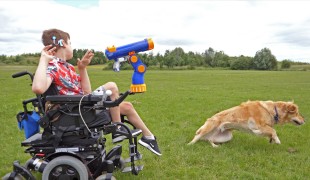- 7181
- 504
- 6
- 5
- 0
- Help Ukraine
About the solution
For most kids it's an easy solution - life vest - but for Harley that just wouldn't work. And when the life vest didn't work, the Johnston family inadvertently invented a swim aid for children with autism.
Paddler supports freestyle, breast-stroke, butterfly and back-stroke movements. Kids love Paddler because it is a fun, new and exciting application of their favorite pool noodle. Parents and swim instructors love Paddler because it supports more versatility for new swimmers.
The strong nylon belt with plastic clip is adjustable and insures a secure fit for most young swimmers. Recommended for ages 2-12.
“The life vest wouldn’t work on Harley. He would just take it off. He needed something that was confortable, around his waist. I looked online for different belts, and than I adapted one, and that’s how The Paddle was born”.
Harley loves being in the water, so his parents have to have to take extra precautions to keep their son safe.
“Kids with autism are attracted to the water because of the compression that provides on their body. When they’re on the water, they have no sense of mortality. So when you put a child with autism in the water, you really have to be cautious”, his father explained.
And now Harley can swim safely.
“From a family perspective, from a safety stand point, is important to know he’s gonna be ok. For Harley, this is perfect. He swims like he’s not wearing an aid", his father concluded.
Adapted from: http://bit.ly/2vnB3Ug
More info: http://bit.ly/2gNyyHt
这些解决方案不应包括使用药物,化学品或生物制品(包括食品);创伤性设备;冒犯性的,商业或内在危险的内容。该解决方案未经医学验证。请谨慎进行!如果您有任何疑问,请咨询健康专家。
DISCLAIMER: This story was written by someone who is not the author of the solution, therefore please be advised that, although it was written with the utmost respect for the innovation and the innovator, there can be some incorrect statements. If you find any errors please contact the patient Innovation team via info@patient-innovation.com
-
-
625
-
0
-
8841

Music to help autistic children
COMMUNICATION: Communicating, whether by speaking, listening, or other means
CAREGIVING
Listening to music
Autism
Podcast
Educational/Leisure device (book, toy, game...)
Social Media
Difficulties with speech
Difficulties learning how to talk
Promoting self-management
Managing Neurological Disorders
Promoting inclusivity and social integration
Improving Speech and Communication
To improve Treatment/Therapy
Raise awareness
Caregiving Support
Child and Adolescent Psychiatry
Neurology
Pediatrics
Psychiatry
United States
-
-
-
583
-
0
-
8062

Teen with cerebral palsy creates device that allows him to paddleboard
BODY BALANCE: Maintaining body balance
CAREGIVING
Swimming
Cerebral Palsy
Walking Aid (wheelchair/walker/crutches)
Muscle cramps or spasms
Difficulty coordinating movements
Stiffness or rigidity (difficulty moving)
Paralysis of the legs and lower body
Muscle weakness
Cognitive impairment
Promoting self-management
Promoting inclusivity and social integration
Caregiving Support
Neurology
Pediatrics
Australia
-
-
-
327
-
0
-
4027

Cerebra design team enable young boy to play fetch with his dog
CAREGIVING
Playing
Cerebral Palsy
Educational/Leisure device (book, toy, game...)
Gait abnormalities (e.g., walking difficulties, unsteady gait)
Difficulty coordinating movements
Stiffness or rigidity (difficulty moving)
Muscle weakness
Numbness or tingling in the extremities
Promoting self-management
Promoting inclusivity and social integration
Neurology
Orthopedics
Pediatrics
Rheumatology
United Kingdom
-
 zh
zh